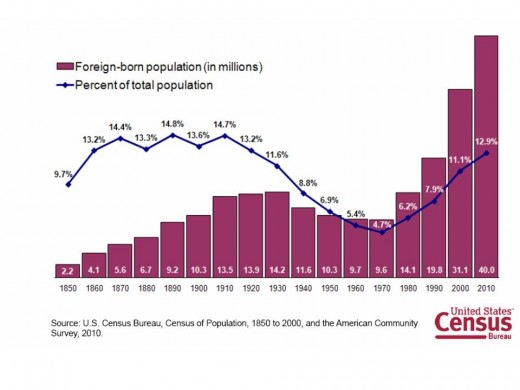Immigration Give me your poor
Immigration: Give me your poor
Immigration: Give me your poor©
Mark Monroe
December 8, 2011
America is an interesting study in contradictions; a short look at our history will support this notion where our mythology purports one thing and our actions appear to be moving in the other direction. Take for instance the stance of some on the issue of immigration. America is a country that exits because of immigration, simply put, if there were no immigrants to America, the country as we know it today, would not exist. A simple definition of an immigrant is, “A person who leaves one country to settle permanently in another.[1]” Based on this understanding every group except Native Americans can be considered as immigrants. I make this claim simply saying that in our history Native American tribes have existed on this continent long before anyone else. However, there is extensive archeological evidence that supports that even Native Americans migrated to this continent from Asia.
To see the ideological conflict in action first read the poem that is inside the Statue of Liberty, which in part says, “Give me your tired, your poor, Your huddled masses yearning to breathe free, The wretched refuse of your teeming shore. Send these, the homeless, tempest-tost to me, I lift my lamp beside the golden door!” This fundamental idea of openness is inconsistent with groups such as Federation for American Immigration Reform (FAIR), which has as one of its stated goals, “to set legal immigration at the lowest feasible levels consistent with the national security, economic, demographic, environmental and socio-cultural interests of the present and future.[2]”Over our short history there are many examples of politicians expressing concern over immigration. The textbook, Strangers to These Shores: Race and Ethnic Relations in America, chronicles one example. It is a correspondence between two of the founding father about the impact of newcomers has on the society.
“In a letter to John Adams in 1798, George Washington indicated his reservations about newcomers, especially when they settled in their own separate communities. His words anticipate many others uttered in the nineteenth and twentieth centuries.
My opinion, with respect to immigration, is that except of usefully mechanics and some particular descriptions of men or profession, there is no need of encouragement, while the policy or advantage of its taking place in a body (I mean the settling of them in a body) may be much questioned; for, by so doing, they retain the language, habits and principles (good or bad) which they bring with them.[3]”
President John F. Kennedy documented in the book A Nation of Immigrants, how ethnic groups faced discrimination when they first appeared in the society. Of the Irish he wrote, “The Irish were the first to endue the scorn and discrimination to be later inflicted, to some degree at least, on each successive wave of immigrants by already settled “Americans.”…The Irish are perhaps the only people in our history with the distinction of having a political party, the Know-Nothings[4], formed against them.[5]” He noted in relation to the Germans that, “they did not feel the sting of ethnic discrimination until the outbreak of the First World War, when they became the targets of wartime hysteria. This hysteria even caused overardent “patriots” to call sauerkraut “Liberty cabbage.[6]” When he spoke about the Italian experience, the reference was to the type of work they could get. “Untrained in special skills and unfamiliar with the language, they had to rely on unskilled labor jobs to earn a living. Italians thus filled the gap left by earlier immigrant groups.[7]” Jewish immigrants had a similar interaction, “Like the Irish and the Italians before them, they had to work at what ever they could find. Most found an outlet for their skills in the needle trades, as garment workers, hatmakers, and furriers. Often they worked in sweatshops.[8]” According to Kennedy Asian immigrants faired worse then those of European decent, “Our behavior towards these groups of newcomers represented a shameful episode in our relationship to those seeking the hospitality of our shores. They were often mobbed and stoned by native Americans.[9][10]”
When President Kennedy wrote this book (1958) he could see the problems that our latest mass immigrant group was facing, and still continue to face “Today many of our newcomers are from Mexico and Puerto Rico. We sometimes forget that Puerto Ricans are U.S. citizens by birth and therefore cannot be considered immigrants. Nonetheless, they often receive the same discriminatory treatment and opprobrium that were faced by our other waves of newcomers. The same things are said today about Puerto Ricans and Mexicans that were once said of Irish, Italians, Germans, and Jews; “They’ll never adjust; they can’t learn the language; they won’t be absorbed.”[11]” The point that Kennedy was showing us is simple, a segment of our population has always tried to stem the flow of newcomers to our shores. With the latest groups to enter are seen as un-American. This attitude is currently being transferred to new immigrants of Arab decent or of the Muslim faith.
Many of the arguments against the influx of new immigrants has a social economic base. Even the practice of importing slaves (forced immigration) ended well before the institution was outlawed, for more than just humanitarian reasons. According to Associate Professor of Political Science at the University of Louisiana at Lafayette, Rick A. Swanson, “Politically, Southern whites feared if the slave population continued to increase in relative proportion to the white population, eventually the slave population would become so large, it would be uncontrollable by the white population and would rebel and even take revenge on their former masters. Economically, states with a large existing slave population such as Virginia would see the value of their slaves increase if the importation of additional slaves was halted.[12]”
Causing some of this trepidation is the tendency in our 24 hour news cycles to interchangeably use immigration and illegal immigration. Painting all new comers with the brush that they taking what belongs to “real” Americans and our country will be over ran with non-Americans. In 2010, 12.9% of our citizens were foreign born. The U.S. Census defines what it means to be foreign born, “Nativity status refers to whether a person is native or foreign born. The native-born population includes anyone who was a U.S. citizen at birth. Respondents who were born in the United States, Puerto Rico, a U.S. Island Area (U.S. Virgin Islands, Guam, American Samoa, or the Commonwealth of the Northern Mariana Islands), or abroad of a U.S. citizen parent or parents, are defined as native. The foreign-born population includes anyone who was not a U.S. citizen at birth, including those who have become U.S. citizens through naturalization.” Chart 1 shows the number of foreign born U.S. citizens. Over the past 160 years there has been a net increase of only 3.2%.

With each new wave of immigrants America gains in their breath of knowledge and ability. As Kennedy points out “Every ethnic minority, seeking its own freedom, helped strengthen the fabric of liberty in American life.[13]”
This leads to the other concern of illegal immigration, which too many is directly responsible for many of the problems facing our society. According to a Department of Homeland Security report, “In summary, the number of unauthorized immigrants living in the United States in January 2010 was 10.8 million—the same as in January 2009—but down from 11.8 million in January 2007.[14]” While there continues to be a debatable issue with legal verse illegal immigration, the numbers reported in the report represent about 3.5% of the population.
In this Presidential election season, the issue of immigration has become the emotional hot button issue, coming up in all the Republican primary debates. This focus seems to be inconsistent with their constituents’ perspective. A Washington Post poll (December 4, 2011) Republicans were asked the following question. “Which of the following is the single most important issue in your choice for the Republican candidate for president? Is it (the economy and jobs), (the federal budget deficit), (immigration), (taxes), (social issues like abortion and gay marriage), (the wars in Iraq and Afghanistan), or something else?[15]” The issue came in fifth with on 3% of respondents claiming it was the top issue. That percent is down from a Fox News poll in May 2011 where 7% of Republican thought that immigration should be the top issue.
It has been reported that the Republican Presidential candidates are trying to prove that they each hold the hardest position on immigration. One example is:
“last month, Romney attacked former House Speaker Newt Gingrich over his support for a plan that would grant temporary work permits -- but not a path to citizenship -- to illegal immigrants who had lived in the United States for 25 years.
U.S. Rep. Michele Bachmann jumped into the fray, promising that, if elected, she would try to deport every one of the estimated 11 million illegal immigrants in the country.
Perry, still smarting from his college-tuition gaffe, said he'd seek more deportations, too, as did former U.S. Sen. Rick Santorum, who added: "I don't like to break up families, but ... we're not sending them to Siberia. They're going to Mexico, which is a great country, a nice country."
And Gingrich, though he didn't walk back from his once-conventional, now-bold proposal for work permits, made it clear that he was talking only about immigrants with deep roots in their communities -- church members, grandparents -- and that he still favors a fence on the U.S.-Mexico border and vigorous enforcement of the law.[16]”
The current political rhetoric is a departure from past leaders. Former President Bush suggested the following for an immigration policy:
“The President Supports A Rational Middle Ground Between A Program Of Mass Deportation And A Program Of Automatic Amnesty. It is neither wise nor realistic to round up and deport millions of illegal immigrants in the United States. But there should be no automatic path to citizenship.[17]”
President Bush’s vision on immigration and the appropriate step to take with illegal aliens is not all that different from President Obama’s approach.
“The President plans to create a 21st century immigration system by:
· Continuing to fulfill the federal government’s responsibility to securing our borders;
· Demanding accountability for businesses that break the law by undermining American workers and exploiting undocumented workers;
· Strengthening our economic competiveness by creating a legal immigration system that reflects our values and diverse needs; and
· Requiring responsibility from people who are living in the United States illegally.[18]”
Both Presidents support a process in which illegal aliens who have lived productive lives here have the opportunity for citizenship. The process should not be easy, but attainable. For we ask a serious commitment from everyone who wants to become a citizen.
I admit that it was an odd event that was the geniuses for this article. In fact, if it were not for a rerun of a TV show, my interest may not have been peaked. The episode in question had to do with a charter, who was born in Israel, was taking her oath of allegiance, which I had never heard before. The oath goes like this:
"I hereby declare, on oath, that I absolutely and entirely renounce and abjure all allegiance and fidelity to any foreign prince, potentate, state or sovereignty, of whom or which I have heretofore been a subject or citizen; that I will support and defend the Constitution and laws of the United States of America against all enemies, foreign and domestic; that I will bear true faith and allegiance to the same; that I will bear arms on behalf of the United States when required by the law; that I will perform noncombatant service in the armed forces of the United States when required by the law; that I will perform work of national importance under civilian direction when required by the law; and that I take this obligation freely without any mental reservation or purpose of evasion; so help me God.[19]"
Like I said I never heard the oath before, and I was not really listen to the program anyway, but there was one line that caught my attention. “I will support and defend the Constitution and laws of the United States of America against all enemies, foreign and domestic.” For those who have served in the U.S. Military these words should be very familiar, for they are contained in the current oath of enlistment that was adopted in 1950.
"I, _____, do solemnly swear (or affirm) that I will support and defend the Constitution of the United States against all enemies, foreign and domestic; that I will bear true faith and allegiance to the same; and that I will obey the orders of the President of the United States and the orders of the officers appointed over me, according to regulations and the Uniform Code of Military Justice. So help me God.[20]"
I am comparing the two oaths because they both are placing a great responsibility on the people who are taking it. To get to the point where a person is allowed to take the oath of allegation, that person has completed many daunting tasks. Why would a country not want citizens who are willing to undergo so much for citizenship? If I had not entered into the military I would not have had to take an oath or have the understanding what that it means. It remains in the best interests of this country to continue to welcome people to become citizens who are willing to live up to the expectation of this oath.
Presidents Carter, Reagan, Bush Sr., Clinton, Bush Jr., and Obama all understood that the immediate expulsion of all illegal aliens is neither practical nor feasible. They appreciated an exclusive quality of the American experience is each successive generation of immigrant families has found a way to retain a part of the ethnic heritage while becoming Americans. Maybe President Kennedy said it best, “Perhaps our brightest hope future lies in lessons of the past. The people who have come to this country have made America, in the words of one perceptive writer, “a heterogenous race but a homogenous nation.[21]”
© All Rights Reserved December 7, 2011
Footnotes
[1] http://www.thefreedictionary.com/immigrant. (accessed July 13, 2011)
[2] http://www.fairus.org/site/PageNavigator/about.html (accessed December 6, 2011)
[3] Parrillo, Vincent N. Strangers to These Shores; Race and Ethnic Relations in the United States 6th edition. Allyn and Bacon. 2000. page 132 The George Washington quote is from the American Observer 50 (November 29, 1971): 4.
[4] Kennedy also believed that the Know-Nothings were the precursor to the Ku Klux Klan
[5] Kennedy, John F. A Nation of Immigrants. Harper Perennial. 1964, 2008. page 18
[6] Just like calling French Fries, Freedom Fries
[7] Kennedy, John F. A Nation of Immigrants. Harper Perennial. 1964, 2008. page 22
[8]IBID page 30
[9]Kennedy is not using the term to represent Native American Indians, rather he is referring to individuals who were born in this country, hence “native American” instead of “Native American”.
[10] IBID Page 30
[11] IBID Page 31
[12] Swanson, Rick A. The Slavery Compromises. http://www.ucs.louisiana.edu/~ras2777/amgov/slavery2.html. (accessed December 6, 2011)
[13] Kennedy, John F. A Nation of Immigrants. Harper Perennial. 1964, 2008. Page 33
[14] Hoefer, Michael, Nancy Rytina, And Bryan C. Baker. Homeland Security Office of Immigration Statistics Policy Directorate. Estimates of the Unauthorized Immigrant Population Residing in the United States: January 2010. page 1
[15] Washington Post-ABC News Poll. http://www.washingtonpost.com/wp-srv/politics/polls/postabcpoll_120411.html. (accessed December 6, 2011)
[16] Mcmanus, Doyle. Immigration and the GOP presidential debates. Los Angeles Times. December 5, 2011. http://www.startribune.com/opinion/otherviews/135058423.html. (accessed December 7, 2011)
[17] President Bush's Plan For Comprehensive Immigration Reform http://georgewbush-whitehouse.archives.gov/stateoftheunion/2007/initiatives/immigration.html. (accessed December 6, 2011)
[18] Fixing the Immigration System for America’s 21st Century Economyhttp://www.whitehouse.gov/issues/fixing-immigration-system-america-s-21st-century-economy. (accessed December 6, 2011)
[19] Naturalization Oath of Allegiance to the United States of America. Department of Homeland Security. U.S. Citizenship and Immigration Services. http://www.uscis.gov. (Accessed July 2, 2011)
[20] http://www.history.army.mil/html/faq/oaths.html. (accessed July 2, 2011)
[21] Kennedy, John F. A Nation of Immigrants. Harper Perennial. 1964, 2008. page 31









